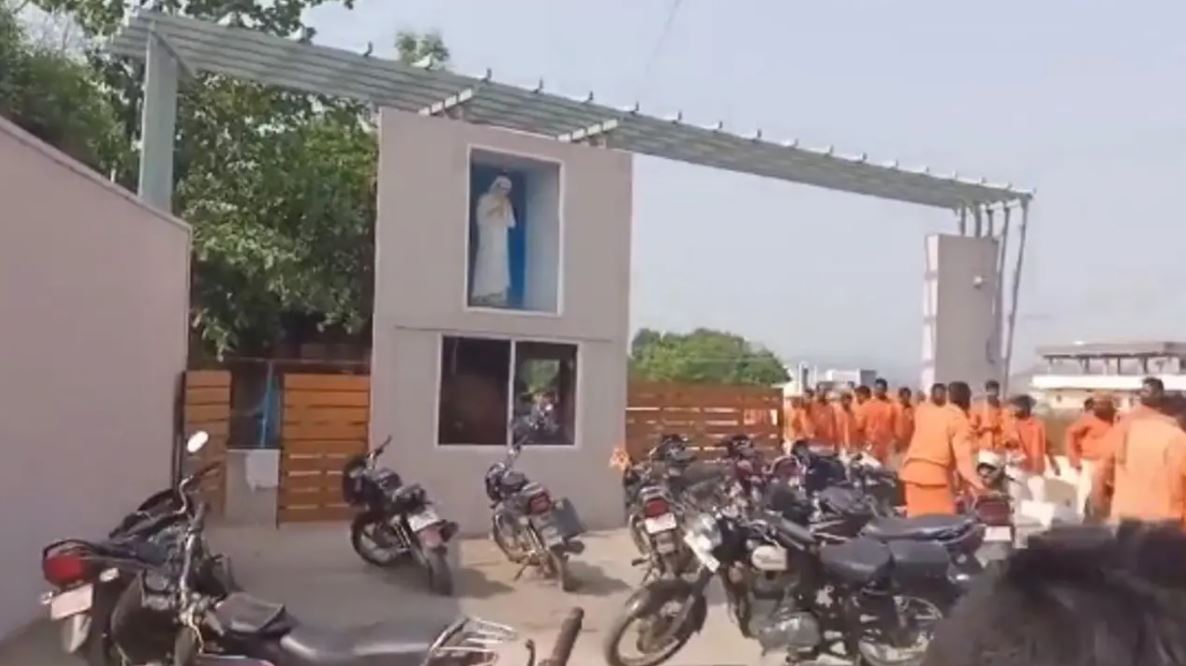
Image Source : X
In recent years, India has witnessed a concerning trend of escalating religious intolerance and violence against minorities, particularly under the tenure of Prime Minister Narendra Modi’s government. The shocking incident at the Blessed Mother Teresa High School in Telangana is emblematic of this disturbing phenomenon, highlighting the erosion of secular values and the marginalization of religious minorities in the country. As such, it is imperative to examine the broader implications of this incident within the context of India’s evolving socio-political landscape.
The events at Blessed Mother Teresa High School unfolded against the backdrop of rising communal tensions and heightened religious polarization in India. According to reports from school authorities, Principal Jaimon Joseph noticed that some students had chosen to wear saffron attire to school, a color often associated with Hindu nationalism and the ruling Bharatiya Janata Party (BJP). In response, he took the reasonable step of requesting these students to bring their parents to the school to address the matter, seeking to maintain a neutral educational environment free from overt displays of religious or political symbolism.
However, what began as a routine disciplinary issue quickly escalated into a violent attack orchestrated by a Hindu mob. Videos circulated on social media platforms depict a scene of chaos and terror, with saffron-clad men wielding sticks and stones as they stormed the school premises. The mob, fueled by religious fervor and extremist ideologies, proceeded to vandalize the school, shattering windows, destroying property, and subjecting staff members to physical assault and intimidation.
One of the most disturbing aspects of this incident is the brazenness with which the mob operated, openly flaunting their allegiance to Hindu nationalist ideologies as they chanted “Jai Shri Ram” slogans and desecrated the school premises. The fact that the attackers felt emboldened enough to target an educational institution and assault its staff highlights the culture of impunity that has taken root in India, where perpetrators of violence against minorities often act without fear of repercussions.
The targeting of religious minorities, particularly Muslims and Christians, has become alarmingly commonplace in India, as evidenced by a spate of similar incidents across the country. From mob lynchings and forced conversions to attacks on places of worship, the fabric of Indian secularism is being torn asunder, replaced by a dangerous rhetoric of majoritarianism and exclusivity.
Under the guise of promoting Hindu nationalism and cultural hegemony, the Modi government has systematically marginalized and disenfranchised minority communities, eroding the principles of equality, diversity, and secularism enshrined in India’s Constitution. The rise of Hindutva ideology, with its supremacist overtones and exclusionary agenda, has cast a dark shadow over the country’s democratic ethos, threatening to undermine the very foundations of its pluralistic society.
The international community must not turn a blind eye to these flagrant violations of human rights and religious freedoms in India. The Modi government’s failure to protect its minority populations and uphold the principles of secularism and pluralism is a cause for grave concern and warrants urgent attention from the global community.
In conclusion, the recent attack on the Blessed Mother Teresa High School is not an isolated incident but rather a symptom of a deeper malaise plaguing Indian society under the Modi government. The systematic targeting of minorities and the stifling of dissent represent a dangerous erosion of democratic values and threaten to unravel the secular fabric of the nation. It is incumbent upon all defenders of democracy and human rights to speak out against such atrocities and stand in solidarity with those who are persecuted for their faith or beliefs. India’s secularism is under siege, and the world cannot afford to remain silent in the face of such egregious violations
To better understand these trends, it’s essential to examine the broader socio-political context. India has long prided itself on its secular ethos, but in recent years, there’s been a rise in Hindu nationalism under the BJP. This ideology promotes Hindu culture above others, leading to religious polarization and violence against minorities. “Saffronization,” the appropriation of Hindu symbols, exacerbates tensions. The recent attack on Blessed Mother Teresa High School exemplifies this, where questioning saffron attire led to violence. Despite constitutional protections, minorities face discrimination, harassment, and violence. Dissent is silenced, and democratic values erode. The international community must hold the Modi government accountable, supporting grassroots efforts and advocating for religious freedom. India’s secularism is under threat, and global action is imperative for a more inclusive future.
